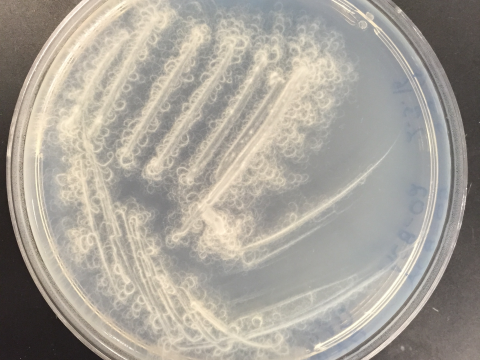Intercontinental Plant Microbiome Research Earns UBiome Grant

Assistant Professor of Biology Jonathan Wilson
Details
Born from a 2012 "Superlab" course, the collaborative project of Haverford Assistant Professor Jonathan Wilson and Iruka Okeke of the University of Ibadan in Nigeria recently received a $100,000 grant of sequencing analysis and technology.
When Jonathan Wilson and Iruka Okeke co-taught a biology "Superlab" course in 2012 they didn't know they were planting the seeds for a larger future collaboration. Back then, they devoted their semester of the annual laboratory course to studying the diversity of bacteria on leaves around the campus arboretum as a way to meld Wilson's plant anatomy and ecology expertise with Okeke's microbiology work with bacteria.
"Students found novel and unusual bacteria, including organisms that had been reported from deserts and rice fields," says Wilson. "And we discovered that this course not only produced exciting scientific results, but also proved to be an effective way to teach microbiology and molecular biology methods at the same time."

Bacterial colony by Audra Devoto '17
Okeke has since returned to Nigeria, her parents' homeland and the country where she attended high school, to teach at the University of Ibadan, but her collaboration with Wilson continues. They are still working to understand the communities of bacteria that live on plant leaves—the phyllosphere—which, says Wilson, is "a microbiome that is nearly as diverse as the microbiome found in the human gut, but often overlooked." Their latest work focuses on the microbiome of the fig plant—genus Ficus—because all over the world different Ficus species are economically important and are often used in traditional medicine due to their antimicrobial properties.
Their project, which will document and compare intercontinental differences between the microbiomes of Ficus plants at Haverford and the University of Ibadan, recently received a $100,000 UBiome grant of sequencing analysis and technology that will support faculty and student research at Haverford and in Nigeria.
"The critical—and expensive—step when identifying bacteria is getting parts of their genome sequenced so they can be identified among the numerous species in large databases," says Wilson. "Preparing a sample for sequencing using our current methods requires exacting work and the costs can be significant for a Superlab class. … UBiome has a competitive process to support microbiome research, and we were thrilled that they chose to support a collaboration between a top-notch university in Nigeria and a small liberal-arts college outside of Philadelphia."
This grant (which was awarded directly to Wilson and Okeke) is not a monetary award, but $100,000 worth of kits, methods, and access to cutting-edge sequencing capabilities that will increase the speed and accuracy of the team's microbiome analyses, and allow them to gather more data for a more complete picture of the bacterial communities. Two Haverford students, Audra Devoto '17 and Charlie Hale '17, will be using these kits for senior thesis research. They will learn modern gene sequencing methods, known as "next-generation sequencing," alongside microbiology and plant biology.
"Because we taught [a] class together and refined our methods as a team," says Wilson of Okeke, "we have a singular opportunity to perform long-term analyses, using the same techniques, on similar plants on opposite sides of the Atlantic Ocean. To our knowledge, a study like this has never been performed before."
-Rebecca Raber



